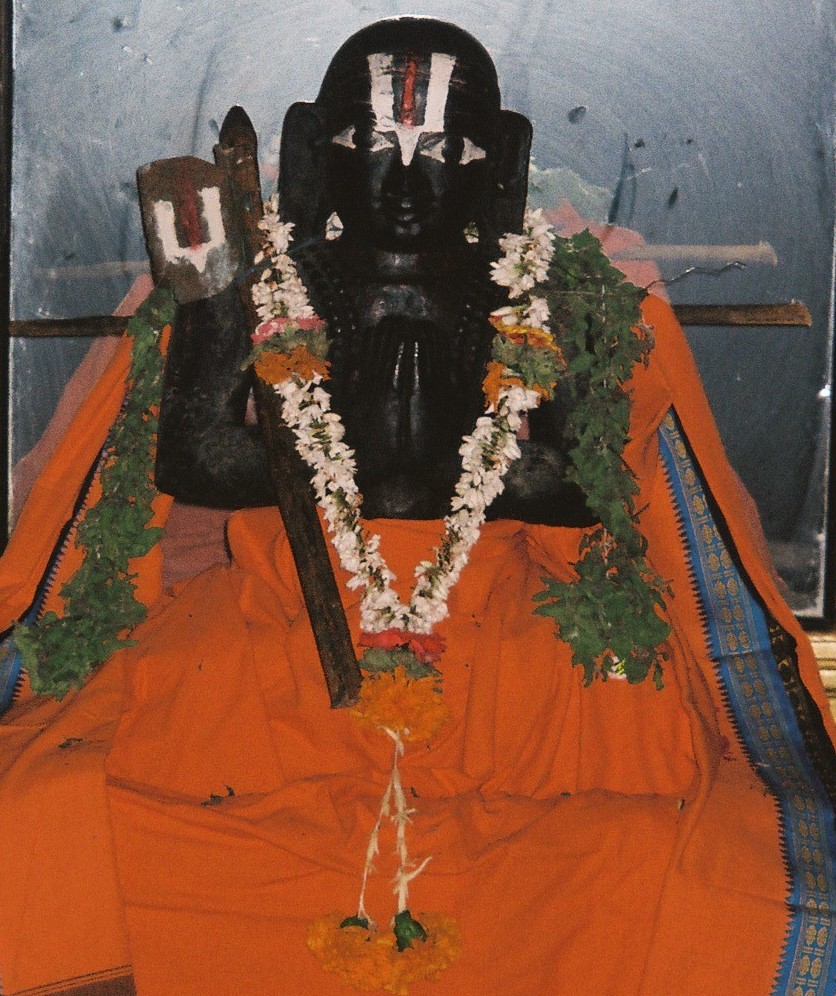Ramanuja
 Ramanuja ('; Middle Tamil: Rāmāṉujam; Classical Sanskrit: Rāmānuja; 1077}} – 1157), also known as Ramanujacharya''', was an Indian Hindu philosopher, guru and social reformer. He is one of the most important exponents of the Sri Vaishnavism tradition in Hinduism. His philosophical foundations for devotional practice were influential in the Bhakti movement.
Ramanuja ('; Middle Tamil: Rāmāṉujam; Classical Sanskrit: Rāmānuja; 1077}} – 1157), also known as Ramanujacharya''', was an Indian Hindu philosopher, guru and social reformer. He is one of the most important exponents of the Sri Vaishnavism tradition in Hinduism. His philosophical foundations for devotional practice were influential in the Bhakti movement.Ramanuja's guru was Yādava Prakāśa, a scholar who, traditionally, is said to have belonged to the Advaita Vedānta tradition, but probably was a Bhedabheda scholar. Sri Vaishnava tradition holds that Ramanuja disagreed with his guru and the non-dualistic Advaita Vedānta, and instead followed in the footsteps of Tamil Alvārs tradition, the scholars Nāthamuni and Yamunāchārya. Ramanuja is famous as the chief proponent of Vishishtadvaita school of Vedānta, and his disciples were likely authors of texts such as the Shatyayaniya Upanishad. Ramanuja himself wrote influential texts, such as Sanskrit bhāsyas on the ''Brahma Sutras'' and the ''Bhagavad Gita''.
His Vishishtadvaita (qualified non-dualism) philosophy has competed with the Dvaita (theistic dualism) philosophy of Madhvāchārya, and Advaita (non-dualism) philosophy of Ādi Shankara, together the three most influential Vedantic philosophies of the 2nd millennium. Ramanuja presented the epistemic and soteriological importance of bhakti, or the devotion to a personal God (Vishnu in Ramanuja's case) as a means to spiritual liberation. His theories assert that there exists a plurality and distinction between Ātman (soul) and Brahman (metaphysical, ultimate reality), while he also affirmed that there is unity of all souls and that the individual soul has the potential to realize identity with the Brahman. Provided by Wikipedia
Showing 1 - 20 results of 49 for search 'Ramanuja 1077-1157', query time: 0.05s
Refine Results
In addition to media from the THWS, media from other Bavarian libraries are also displayed.
These are marked with the "Interlibrary loan" label and can be ordered by clicking on them.
These are marked with the "Interlibrary loan" label and can be ordered by clicking on them.
-
1
Siddhānta des Rāmānuja ein Text zur Indischen Gottesmystik by Ramanuja 1077-1157
Published 1923Call Number: Loading…
Located: Loading…Book Loading… -
2
-
3
The Vedāntasūtras with the Śrībhāṣya by Ramanuja 1077-1157
Published 1989Call Number: Loading…
Located: Loading… -
4
The gītābhāṣya of Rāmānuja by Ramanuja 1077-1157
Published 1985Call Number: Loading…
Located: Loading… -
5
-
6
-
7
Nyāyaratnamālā of Pārthasārathimiśra with the commentary of Rāmānujācārya entitled the Nayakaratna by Ramanuja 1077-1157, Pārthasārathimiśra ca. 1050-ca. 1120
Published 1937Call Number: Loading…
Located: Loading… -
8
Śrībhāṣyam by Ramanuja 1077-1157, Śāstrī, Sudarśanācārya
Published 1917Call Number: Loading…
Located: Loading… -
9
Śrībhāṣyam Abhyaṃkaropāhva-Vāsudeva-Śāstri-viracitayā vivṛtyā sametam by Ramanuja 1077-1157
Published 1916Call Number: Loading…
Located: Loading… -
10
Śrībhāṣyam Abhyaṃkaropāhva-Vāsudeva-Śāstri-viracitayā vivṛtyā sametam by Ramanuja 1077-1157
Published 1914Call Number: Loading…
Located: Loading… -
11
Vedāntadīpaḥ Bādarāyaṇa-sūtrāṇāṃ Saṃgraha-vyākhyā-rūpaḥ = Vedāntadeepa = a gloss on Brahmasutras by Ramanuja 1077-1157
Published 1902Call Number: Loading…
Located: Loading… -
12
Śrībhāṣyam Bādarāyaṇa-praṇīta-Vedāntasūtrasya Rāmānujācārya-kṛtaṃ Viśiṣṭādvaita-paraṃ vyākhyānam = Śri Bháshyam by Ramanuja 1077-1157
Published 1888Call Number: Loading…
Located: Loading… -
13
-
14
-
15
The Vedānta-Sūtras by Bādarāyaṇa ca. v2. Jh. / 2. Jh, Ramanuja 1077-1157
Call Number: Loading…
Located: Loading… -
16
Śrībhāṣyam Abhyaṃkaropāhva-Vāsudeva-Śāstri-viracitayā vivṛtyā sametam by Ramanuja 1077-1157
Call Number: Loading…
Located: Loading… -
17
-
18
Vedārthasaṃgrahaḥ vimarśātmakaṃ sampādanam by Ramanuja 1077-1157
Published 1991Call Number: Loading…
Located: Loading… -
19
The Vedāntasūtras with the Śrībhāṣya by Ramanuja 1077-1157
Published 1988Call Number: Loading…
Located: Loading… -
20
The Vedāntasutas with the Śrībhāṣya by Ramanuja 1077-1157
Published 1988Call Number: Loading…
Located: Loading…
